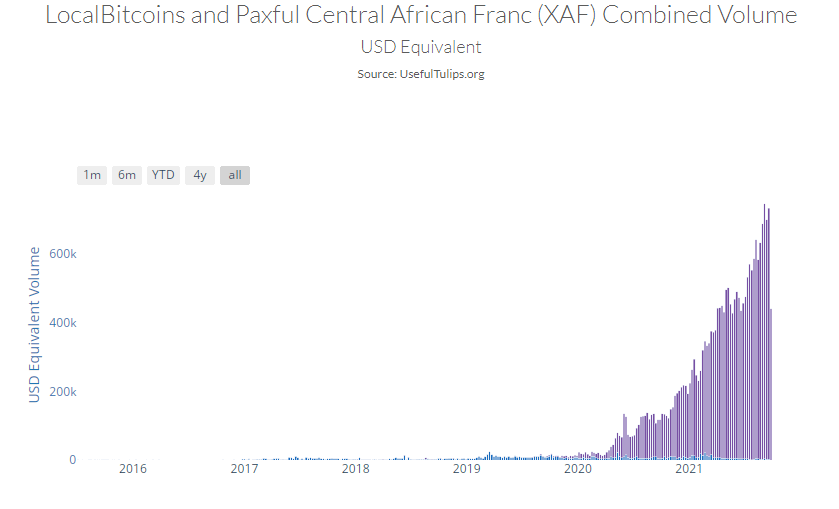
Following the confusion that surrounded initial reports, a senior staffer in the Central African Republic (CAR)’s presidency has now confirmed that bitcoin will become the country’s reference currency.
First Country in Africa to Officially Adopt Bitcoin
A press statement supposedly issued by the office of the Presidency of the Central African Republic (CAR) appeared to confirm reports by multiple media outlets suggesting that the bill passed by the National Assembly not only proposes to govern cryptocurrencies but recognizes bitcoin as a reference currency.
In a statement posted on Facebook, Obed Namsio, the chief of staff, said President Faustin Archange Touadera’s government will support all necessary efforts that allow the country to “carry out this approach that places the Central Africa Republic on the map of the most courageous and visionary countries in the world.”
Namsio said with this move the CAR had become the first country on the African continent to adopt bitcoin as a reference currency. Lauding the move, Namsio said:
We are going on a new path that will mark a new milestone for our country while being aware of the difficulties we will have to face to continue our mission.
The chief of staff’s statement, however, appeared to contradict an earlier report by Bloomberg suggesting the bill passed had only gone as far as to propose the creation of a cryptocurrency regulator.
Conflicting Reports
In the report, Hervé Ndoba, the minister in charge of finance and budget, is quoted insisting the CAR is not about to follow in the footsteps of El Salvador, which became the first country to introduce bitcoin as legal tender. Rather, the proposed legislation only seeks to establish a regulatory framework, the report quotes minister stating.
 While the release of the French language statement is expected to end the confusion which followed the initial report which said the country had adopted bitcoin, Useful Tulips’ peer-to-peer bitcoin volume data starting in 2020 suggests interest in the crypto had been growing. In fact, by the end of September 2021, the CAR had, according to the data, become the country with the fifth-highest P2P volumes in Africa.
While the release of the French language statement is expected to end the confusion which followed the initial report which said the country had adopted bitcoin, Useful Tulips’ peer-to-peer bitcoin volume data starting in 2020 suggests interest in the crypto had been growing. In fact, by the end of September 2021, the CAR had, according to the data, become the country with the fifth-highest P2P volumes in Africa.
Bitcoin ‘Undefeated’
Meanwhile, the news and Namsio’s apparent confirmation of CAR’s decision have delighted players in the crypto community. In comments shared with Bitcoin.com News, Christos Krokides of ARK36, a crypto hedge fund, said:
“Bitcoin adoption continues undefeated by any geopolitical or financial global matters. Even in such uncertain times, the Central African Republic (CAR) adopted bitcoin as a legal tender marking yet another big step toward a global digital transformation. This initiative will completely transform the CAR’s digital infrastructure, which is now considered underdeveloped, by applying the blockchain technological innovation necessary for the project’s implementation.”
Ransu Salovaara, the CEO of Likvidi, said that as “bitcoin gets bigger and bigger, it will become also more stable and that will speed up the government level adaptation even more.”
However, others like Anthony Oduu, the co-founder and CTO at cross-border payment platform Verto, said a wider adoption of the crypto will depend on attitudes as well as how the country improves its infrastructure, elaborating:
“Country-wide adoption will be very much dependent upon the performance of infrastructure and locals’ attitudes towards the currency. The Central African Republic does not have the best standard of telecommunications and digital infrastructure. In 2021, internet penetration was around 10% and mobile connections were available to just 30% of the population.”
According to Oduu, the CAR needs to invest significantly in infrastructure in order to make digital currencies accessible to the entire population.
What are your thoughts on this story? Tell us what you think in the comments section below.
Image Credits: Shutterstock, Pixabay, Wiki Commons
Disclaimer: This article is for informational purposes only. It is not a direct offer or solicitation of an offer to buy or sell, or a recommendation or endorsement of any products, services, or companies. Bitcoin.com does not provide investment, tax, legal, or accounting advice. Neither the company nor the author is responsible, directly or indirectly, for any damage or loss caused or alleged to be caused by or in connection with the use of or reliance on any content, goods or services mentioned in this article.

